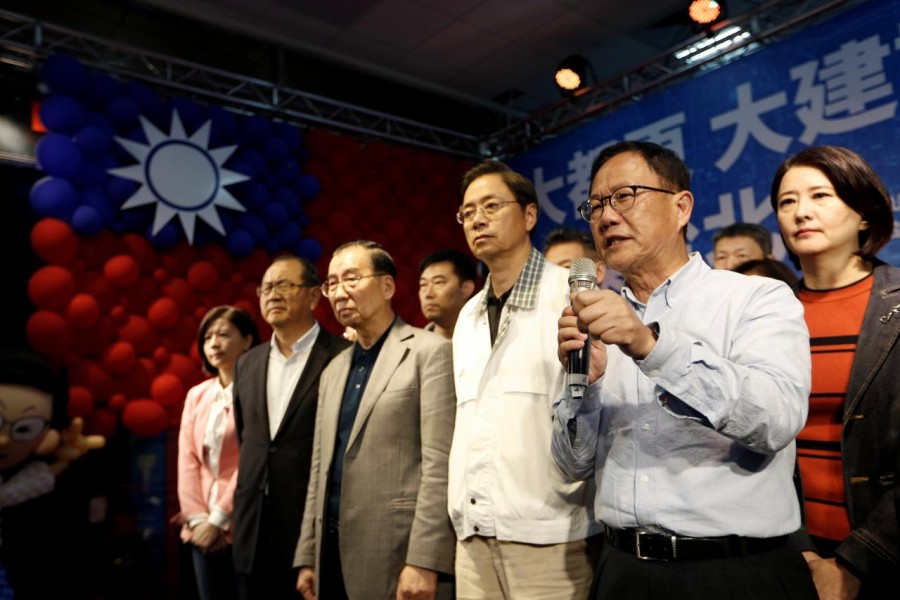Voters in Taiwan have delivered a strong rebuke to the island’s pro-independence ruling party in local elections, emboldening the China-friendly opposition, one of whose main figures says he will now reach out to Beijing to forge more friendly ties.
The ruling Democratic Progressive Party (DPP) suffered major elections loss on Saturday, losing two key mayoral races, while the opposition Kuomintang took or retained control of 15 cities and counties, leaving the DPP with only six.
With little more than a year before presidential elections, Taiwan President Tsai Ing-wen, who has had tense relations with Beijing since her election in 2016, on Saturday took responsibility for her party’s losses and resigned as DPP chairwoman.
The Kuomintang mayor-elect of the southern port city of Kaohsiung, formerly a DPP stronghold, moved swiftly on Saturday night to reach out to China, telling local media he will set up a working group on China relations and will break down barriers.
“We have no walls around our hearts,” said Han Kuo-yu, who has previously described Taiwan independence as being “more scary” than syphilis.
The Kuomintang has sent delegations to China since Tsai took office, where they have been warmly received. China has refused to have direct contacts with Tsai’s administration.
China, which claims Taiwan as a wayward province, said the elections showed people wanted peaceful relations with Beijing.
“The results reflected the strong will of the Taiwan public in hoping to continue to share the benefits of the peaceful development of relations across the Taiwan Strait, and their strong wish in hoping to improve the island’s economy and people’s wellbeing,” said a statement by China’s policy-making Taiwan Affairs Office and carried by state media.
Voters also rejected a referendum that would have seen the island join the 2020 Tokyo Olympics as Taiwan, rather than “Chinese Taipei”, a move which would have angered Beijing.
China’s Taiwan Affairs Office said it showed voters “putting Taiwanese athletes’ interests at stake is against people’s will”. “The attempts of ‘Taiwan independence’ are doomed to fail,” it added.
The WeChat account of the overseas edition of the Communist Party’s official People’s Daily said Han had realized one important reality: “Taiwan will only be good if relations across the Taiwan Strait are good”.
China is suspicious that Tsai wants formal independence, a red line for Beijing which regards Taiwan as its own.
Tsai says she wants only the status quo with China, but will defend Taiwan’s security. Chinese law mandates the use of force to prevent the island from seceding.
Tensions across the Taiwan Strait have heightened with China conducting military drills around the island and snatching away Taiwan’s dwindling number of diplomatic allies.
DPP Secretary General Hung Yao-fu, asked on Saturday about whether the China factor had played a role in influencing the elections, reiterated there had been a problem with “fake news”.
“I think this time was a deep lesson, in terms of fake news messing up with a lot of people’s judgment or not getting clear information,” he told reporters.
“This is a global problem not just Taiwan’s unique problem.”
Taiwan president casts ballot in polls highlighting social and political rifts
SPECIAL MARRIAGE EQUALITY LAW
Taiwanese voters on Saturday also rejected a referendum on legalizing same-sex marriage, another blow for Tsai, who in her 2016 campaign promised marriage equality. However, she has made little progress on the issue.
In an Asian first, Taiwan’s constitutional court declared in May of last year that same-sex couples had the right to legally marry, and set a two-year deadline for legalization.
But voters instead backed a referendum that defines marriage as between a man and a woman.
“This is a victory for all the people who support family values and education for the next generation,” the Coalition for the Happiness of Our Next Generation, a group opposed to same-sex marriage, said in a statement.
Taiwan cabinet spokeswoman Kolas Yotaka told Reuters a special law will be drafted for marriage equality, and that the government continued to support the issue.
Rights activists called a special law for same-sex marriage “discriminatory” and that the referendum was illegal and against the constitution.
Dozens of supporters for marriage equality gathered in the capital Taipei early on Sunday, with some weeping as the result became clear. Chi Chia-wei, a veteran gay rights activist, said he remained positive about the fight for equality.
“The ones opposing us are getting fewer and fewer,” he told Reuters.
Taiwan’s capital Taipei celebrates an annual gay pride parade that showcases the vibrancy of its lesbian, gay, bisexual and transgender (LGBT) community. The one-week celebration in October, largest in Asia, contributes more than $3.3 million to the economy, according to Taipei Times.


